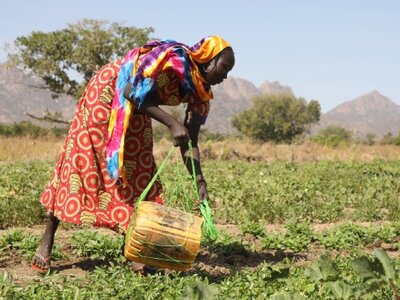Chad
- 3.4 million
- projected to face acute hunger during lean season
- 1.9 million
- acute malnourished children aged 6 to 59 months
- 1.2 million
- refugees
Chad is a landlocked Sahelian country in central Africa, with one of the highest levels of hunger in the world – 42 percent of its population live below the poverty line.
High food prices, below-average market supplies, continued disruption of cross-border trade in the east – due to the conflict in Sudan – and the impact of climate shocks have contributed to worsening hunger and poverty in the country.
A total 3.4 million people are acutely food insecure due to the worst lean season ever recorded for the country and a staggering 240 percent increase since 2020.
Chad is host to more than 1.2 million refugees – one of the largest and fastest-growing refugee populations in Africa. The recent conflict in neighbouring Sudan has driven hundreds of thousands more across the border.
Nearly 1.7 million people have been affected by devastating floods in all 23 provinces of Chad – the worst in decades – destroying livestock, houses, health facilities and schools while taking lives.
Serious funding shortfalls and resources redirected to the refugee crisis in the East mean that internally displaced people in Lake Chad – where over 220,000 are located – and most refugees from Cameroon, Central African Republic and Nigeria have not received any assistance for months. WFP has increasingly received support from donor and now advocates for maximum flexibility of contributions to respond to multiple crises in the most efficient way.
The World Food Programme focuses on life-saving emergency activities and strengthening the country’s long-term resilience. In our mission to end food insecurity and malnutrition, we continue to work alongside the Government and other UN agencies and partners.
What the World Food Programme is doing in Chad
-
Food assistance
-
WFP plans to assist 2.5 million people throughout the country including refugees, IDPs, returnees and other vulnerable people. We assisted up to 1 million people with food, cash and nutrition support from June to August 2024, to help offset the impact of the lean season. Food and cash-based assistance will also be provided to 400,000 people affected by floods.
-
Nutrition
-
School meals
-
Asset creation and livelihoods
-
Social protection
-
Logistics
Chad news releases
Go to pagePartners and donors
Find out more about the state of food security in Chad
Visit the food security analysis pageContacts
Office
BP 6308, Programme Alimentaire Mondial, Quartier Béguinage, îlot Q, lot 2, TF n° 1159, croisement de l’avenue Galmai Youssoubomi
N'Djamena
Chad







